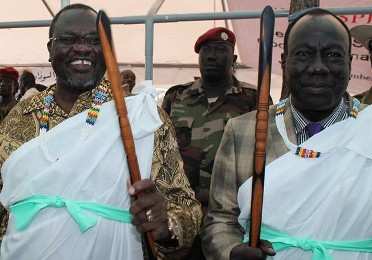South Sudanese rebels to consult in Pagak on IGAD-Plus peace proposal: spokesperson
July 26, 2015 (ADDIS ABABA) – South Sudan’s armed opposition faction of the governing Sudan Peoples’ Liberation Movement (SPLM-IO) under the leadership of former vice president, Riek Machar, will convene a consultative meeting in the first week of August on IGAD-Plus peace proposal to end the 19-month long civil war in the country, rebel leader’s press secretary has said.

Dak said the opposition faction had received the latest copy of the IGAD-Plus proposal, adding it will be discussed in the leadership meeting with the aim to come up with a position to the document.
The meeting, he added, will include political and military leaderships including representatives of the movement from abroad.
He said the IGAD-Plus proposal had a lot to be desired so as to end the war with president Salva Kiir, saying it did not address many of the concerns earlier raised by the rebel group on issues of governance, security arrangements, reforms, accountability, compensation and reparation, power-sharing, among others.
The East African regional bloc, known as the Intergovernmental Authority on Development (IGAD), last week unveiled its latest reviewed proposal for a compromise between the warring parties.
The expanded IGAD-Plus mediation which includes countries and international bodies beyond the African continent has also given the two warring parties a 17 August deadline to sign a final peace agreement.
The compromise position is however similar to the previous IGAD proposal in March which the two parties rejected.
In the latest document the power sharing in the national executive would be 53% of ministerial positions for the government, 33% for the opposition faction of the Sudan Peoples’ Liberation Movement (SPLM-IO), 7% for former detainees and 7% for other political parties.
In the oil-rich greater Upper Nile region, the SPLM-IO would have 53% in the three states of Unity, Upper Nile and Jonglei, while the government would take 33% and 14% divided between former detainees and other political parties. No power sharing in the seven states of greater Bahr el Ghazal and greater Equatoria regions as government would take 100% in the two regions.
Also the top executive at the national level would include the incumbent president Kiir, first vice president to be named by the SPLM-IO and the incumbent vice president, James Wani Igga.
While the president shall be the executive head of state and chair the council of ministers, national defence council and national security council, the first vice president deputizes him and acts on his behalf in the event of absence.
The main task of the first vice president would be to initiate and implement reforms in the transitional government of national unity. There are other functions which are joint executive powers that need consultations between the president and the first vice president, and at times include the vice president in consultations.
The national legislative assembly would expand from the current 332 membership to 400 members. Members who rebelled from within the 332 MPs will be reinstated. SPLM-IO would appoint 50 additional new members to the parliament and former detainees plus other political parties would appoint 18. The Council of states would not be affected.
The speaker of the national parliament should also come from the states of greater Equatoria region.
On security arrangements, it proposed a period of 18 months of the 30-month long transitional period to complete integration process of the two rival armies.
The national capital, Juba, will be demilitarized, according to the IGAD-Plus proposal, and to be known as a Special Arrangement Area (SAA) with a radius of 25kms.
Foreign forces from the United Nations Mission in South Sudan (UNMISS), IGAD and African Union (AU) would take over the security of the capital until the end of the two and a half years of transitional period.
President Kiir would be allowed to have only 260 bodyguards in the capital while the would-be first vice president, Machar, would have 195 bodyguards in Juba.
An unidentified size of another force would be deployed to protect military barracks.
The parties have been served with the copy of the proposed peace agreement and are expected to consult with their respective constituencies about the document before resumption of the peace talks in mid-August.
Talks collapsed on 6 March when the two principal leaders could not agree on almost all the outstanding issues on governance, security arrangements, reforms, power sharing and accountability and justice, reparation and reconciliation.
(ST)
